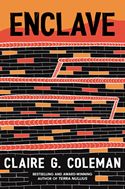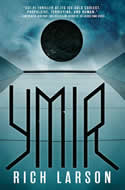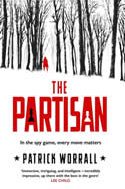Reviewed by Robert Goodman.
By Sarah Moss, Granta.
 Ghost Wall, the sixth book by British author Sarah Moss is a short and sharp as a flint knife. The book is a coming-of-age tale that explores the power of the past to be used to inform and drive action. Along the way, Moss deeply questions the Brexit movement and gender power dynamics.
Ghost Wall, the sixth book by British author Sarah Moss is a short and sharp as a flint knife. The book is a coming-of-age tale that explores the power of the past to be used to inform and drive action. Along the way, Moss deeply questions the Brexit movement and gender power dynamics.
Ghost Wall opens in prehistoric times, with the death of an Iron Age woman at the hands of her tribe. Cut to the a period closer to the modern day, sometime not long after the fall of the Berlin Wall. Teenage Sylvie has been taken with her parents to join a university project in ‘experimental archaeology’ in the Northumbrian countryside. The aim of the project is for the family, along with the professor and his three young adult students to live as far as possible as people did in the Iron Age. As Sylvie observes:
that was the whole point of the re-enactment, that we ourselves become the ghosts, learning to walk the land as they walked it two thousand years ago, to tend our fire as they tended theirs and hope that some of their thoughts, their way of understanding the world, would follow the dance of muscle and bone. To do it properly, I thought, we would almost have to absent ourselves from ourselves, leaving our actions, our reenactions, to those no longer there. Who are the ghosts again, us or the dead?
Camped in the shadow of Hadrian’s Wall, an area of forests, peat bogs and wild coasts, they wear burlap tunics, eat gruel, foraged greens and caught rabbits and fish, and some sleep in a hut on straw (the students stay in tents). Moss’s feel for the landscape brings this experiment alive. It is not hard to picture the little encampment, the nearby creak or the flat, tidal beach. Moss follows as Sylvie leads the students on foraging expeditions in the forests and when they take her back to civilization and along the local highway for sneaking visits to the local Spar.
Within a few days our feet would wear a path through the trees to the stream, but that first night there was moss under foot, squashy in the dim light, and patches of wild strawberries so ripe and red they were still visible in the dusk, as if glowing.
Cracks start to appear in the group and as some buy more fully into the re-enactment. Sylvie is caught between the free and cynical students who she idolises and her strict, often violent father who uses the experiment as a justification for his intensely patriarchal views.
While set in the early 1990s, Ghost Wall feels like a post-Brexit book. Moss uses her scenario to explore the mindset that drove people to vote to leave Europe. Sylvie’s father romanticises the Iron Age as a time of pure Britishness, corrupted first by the Romans and then by waves of other foreigners.
Dad didn’t like the Irish, tended to see Catholicism in much the same light as the early form of Roman imperialism. Foreigners coming over here, telling us what to think. He wanted his own ancestry, wanted a lineage, a claim on something. Not people from Ireland or Rome or Germania or Syria but some tribe sprung from English soil like mushrooms in the night…
With no evidence, Sylvie’s father believes that he is connected to these early inhabitants of the Island:
Right, said Pete, you mean he likes the idea that there’s some original Britishness somewhere, that if he goes back far enough he’ll find someone who wasn’t a foreigner.
Sylvie also has to deal with domestic violence. What starts off appearing as old fashioned chauvinism, emboldened by the Iron Age experiment, quickly reveals itself to be violent and abusive control. This is a state of affairs that both Sylvie has become habituated to, accepting to a degree that if she is hit it is her fault:
Unless he found some other reason; some days I just knew he needed to hit me and however carefully I trod, sooner or later I’d give him cause…
The professor and his students, possibly caught up in the experiment or just unwilling to intervene, are either oblivious or refuse to believe or act upon the violence in their midst. And Sylvie’s mother sets an example of meek acceptance of her fate:
…It just doesn’t seem very fair, that’s all [Sylvie said]. Life isn’t, [Sylvie’s mother] said, which was what she always said. Mustn’t grumble, can’t be helped, nothing to be gained by making a fuss, well you wouldn’t want to make trouble, would you?
And over time, buying into a patriarchal interpretation of the experiment, many of the participants start to consider the idea that some sort of violence may be essential to the experience. The building of a ghost wall – a barrier of woven sticks decorated with skulls – symbolically pushes them further towards contemplating how they might channel the sacrificial practices of the Iron Age.
In Ghost Wall, Sarah Moss manages to walk that fine line between childhood innocence and adult knowledge. Sylvie understands more than she pretends to, hiding truths from herself but revealing those truths through both her actions and the actions and words of others. This is a multilayered tale where the underlying issues inform but never overwhelm the story. Making this both a violent, though sometimes sweet, coming of age story and a cautionary tale for those looking to the past for a steer on the future.
This review first appeared in Newtown Review of Books.
This and over 300 more reviews can be found at Pile By the Bed.












